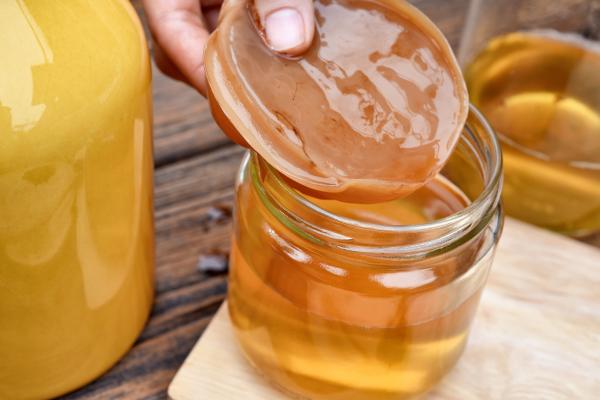Kombucha, also known as tea mushroom, is a naturally fermented drink with a long history of use in traditional Chinese medicine, renowned for its healing properties. Over time, it has gained global popularity, particularly in America and Europe, where it enjoys a strong reputation, especially among organic diet enthusiasts.
It has many properties for the body both healing and depurative, however in addition to benefits it also has some contraindications. It should not be taken as a substitute for any treatment and it is advisable to consult a doctor. However, if you want to know more about this drink, in this article we tell you what with the properties of kombucha tea, how to do it and what are its contraindications.

What is kombucha
Kombucha is not a traditional plant infusion or tea; instead, it originates as a unique drink from a colony of gelatinous microorganisms that ferment sweetened tea with sugar, earning it the nickname “mushroom tea.” These yeast-like organisms efficiently convert sugar into glucose, fructose, ethyl alcohol, carbon dioxide, and acetic acid. Due to its perpetual fermentation with continuous nourishment, enthusiasts have dubbed it “immortality tea” or “immortality mushroom,” reflecting its enduring nature and numerous medicinal properties.
Various types of tea can be utilized for its preparation, and the selection of fungi or bacteria depends on the tea employed. The primary fermentation method involves the use of a symbiotic colony of bacteria and yeasts known as SCOBY (Symbiotic Culture of Bacteria and Yeast). This process metamorphoses the tea into a probiotic beverage, preserving all its inherent qualities. Furthermore, this fermentation yields essential vitamins such as B and C groups, enzymes, amino acids, and detoxifying organic acids, notably lactic acid for improved digestion and acetic acid, considered a natural antibiotic.
Benefits and properties of kombucha tea
As we have seen, the fermentation of sweetened tea imparts numerous beneficial properties to this drink. Since ancient times, the Chinese used it as a medicinal beverage, and now it has become a staple in many organic and ecological diets, readily available in supermarket organic sections. Due to its medicinal properties, it earned the nickname “tea of immortality.” Let's explore some of the benefits of kombucha tea:
- Probiotics: To make Kombucha, you ferment sweetened tea with a SCOBY, which stands for a symbiotic culture of bacteria and yeast. This fermentation process produces probiotics, which are beneficial live microorganisms that can support gut health by promoting a balanced gut microbiome.
- Improved Digestion: The probiotics in kombucha may help improve digestion and aid in the breakdown of food, potentially reducing symptoms of digestive issues like bloating and indigestion.
- Rich in Antioxidants: Kombucha contains antioxidants, such as polyphenols, which can help neutralize harmful free radicals in the body and may reduce oxidative stress.
- Detoxification: Some studies suggest that kombucha may aid in the detoxification process by supporting the liver's natural detox pathways.
- Potential Immune Support: The probiotics and antioxidants in kombucha may contribute to supporting a healthy immune system.
- Joint Health: Kombucha contains glucosamine, which is beneficial for maintaining joint health and may help alleviate joint pain and stiffness.
- Potential Blood Sugar Regulation: Some research suggests that kombucha may help regulate blood sugar levels, which could be beneficial for individuals with diabetes.
- Weight Management: Kombucha is a low-calorie beverage that can be a healthier alternative to sugary sodas and fruit juices, potentially supporting weight management efforts.
In addition to all the healing properties of kombucha tea, let's remember that it can also be applied topically to harness its skin benefits, like reducing aging spots, improving acne, and assisting in psoriasis treatment. It also strengthens the scalp, though it may lighten it.
How to brew kombucha tea
To prepare it at home, the container's significance cannot be overlooked, as the tea remains in prolonged contact with it, possibly causing lead poisoning. Hence, it is advisable to utilize a sterilized glass jar or bottle for safe storage. You can sterilize it by letting it boil in hot water for a few minutes. Use cork stoppers to cover the jars to prevent them from breaking from the accumulation of carbon dioxide (CO2). You should not use bleach or dishwasher to clean the can, as it can add other bacteria. And it is always very important to wash your hands very well. Let's see the preparation of kombucha tea for a 1 Liter container. You need:
Ingredients
- 1 SCOBY (Symbiotic Culture of Bacteria and Yeast). You can find it in herbalists or natural stores.
- 200ml of kombucha from a previous batch or store-bought unpasteurized kombucha (as a starter liquid)
- 1 black or green tea bags (organic and non-flavored)
- 50 grams of granulated sugar (organic cane sugar works well)
- 800ml of filtered water (plus additional water for dilution)
- Glass jar or container (1-liter capacity or larger)
- A piece of cloth that can cover the lid of the jar, that is thick and clean. It can be a tea towel.
- Rubber band
Steps to make kombucha tea
1: Prepare Your Brewing Environment Ensure that your brewing equipment, glass jar, and hands are thoroughly cleaned with hot, soapy water. Avoid using antibacterial soap or any cleaning agents that can harm the SCOBY.
2: Brew the Tea Boil 800ml of filtered water, then add the tea bags. Let the tea steep for about 15 minutes. Remove the tea bags and stir in the granulated sugar until fully dissolved. Allow the sweetened tea to cool to room temperature.
3: Add the SCOBY and Starter Liquid Once the sweetened tea has cooled, pour it into your clean glass jar. Carefully place the SCOBY on top of the tea. If your SCOBY came with some starter liquid, pour it into the jar as well. The starter liquid helps kickstart the fermentation process.
4: Cover and Ferment Cover the jar with a breathable cloth or coffee filter, and secure it with a rubber band to keep out debris and pests while allowing airflow. The ideal place has to have a temperature between 21 and 26 degrees, with ventilation but not giving direct sunlight. And it is very important that it is not next to other fermented foods such as yogurt. The fermentation will depend on the environment and it is important not to move it.
5: Patience is Key Let the kombucha ferment for about 7 to 14 days, depending on your taste preference. The longer it ferments, the tangier and more carbonated it becomes. It's a good idea to taste it every few days to find your desired level of sweetness and acidity.
6: Bottle and Second Fermentation (Optional) Once the kombucha reaches your preferred taste, it's time to bottle it. Carefully remove the SCOBY and set it aside with some of the finished kombucha for your next batch. You can also add fruits, or herbs, to the bottled kombucha for a second fermentation, which enhances flavour and creates natural carbonation.
7: Refrigerate and Enjoy Seal the bottles tightly and store them in the refrigerator. The cold temperature slows down fermentation, so the kombucha will keep longer. Serve it chilled and savour the fizz, tang, and myriad health benefits of your homemade kombucha!
How to drink kombucha tea
You can buy ready-made kombucha tea or make it at home. The taking of this drink depends on the affects you want to consume. Although it is normal to take two glasses a day for digestive processes. You may take three if you want to lose weight. Of course, for this last objective it is convenient to do it on an empty stomach, better before meals. We recommend you read this other post about How to drink kombucha tea to lose weight.
However, it is advisable that you go to your doctor to see if kombucha is suitable for you or for the affects you want to achieve.
Contraindications of kombucha tea and possible side effects
In addition to the properties that kombucha possesses, it also has contraindications and side effects. Therefore it may not be good for everyone. You may go to the doctor before taking it, since some of its components may not be good for you, depending on your case.
Kombucha tea is contraindicated in the following cases:
- Pregnancy and lactation: some of its components can affect the development of the fetus. During breastfeeding, you can pass the substances to the baby through milk. The baby may not metabolise them in the same way or it may not be good.
- In people with a weakened or not very strong immune system. For example, in children, who do not have a digestive system prepared for this drink that is rather strong. Their liver and kidneys do not metabolise and eliminate kombucha just like an adult. People with a weak immune system should not take this drink because it is fermented by mushrooms and it can be colonised by germs easily. It can cause conditions that are more serious in this type of people.
- People with liver or kidney disease: for the fact of not metabolizing well the components of the fermented drink.
- Patients with heart problems.
- People with diabetes: it has large amounts of sugar. Although it is transformed during fermentation, there may be traces that produce changes in the blood glucose levels of diabetics.
- People with clotting problems.
In addition, it can have some side effects such as:
- Nausea or even vomiting.
- Acidity. It is a very acidic drink, its pH is between 2 and 3, therefore if you take it in large quantities, can cause heartburn.
- Allergic reaction or rashes.
- Headache.
As with any dietary supplement or natural remedy, it's best to approach kombucha with moderation and consider individual health factors. If you have any underlying health conditions, concerns, or questions about kombucha's potential benefits or risks, it's advisable to consult with a healthcare professional or registered dietitian before incorporating it into your diet.








